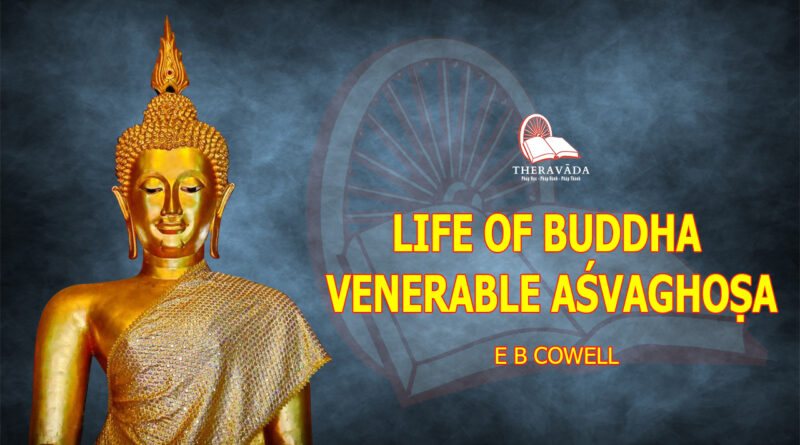Life of Buddha Venerable Aśvaghoṣa
Translated by E B Cowell
Introduction
The Sanskrit text of the Buddha-carita was published at the beginning of last year [i.e 1893] in the ‘Anecdota Oxoniensia,’ and the following English translation is now included in the series ‘Sacred Books of the East.’ It is an early Sanskrit poem written in India on the legendary history of Buddha, and therefore contains much that is of interest for the history of Buddhism, besides its special importance as illustrating the early history of classical Sanskrit literature.
It is ascribed to Aśvaghoṣa; and although there were several writers who bore that name, it seems most probable that our author was the contemparary and spiritual advisor of Kaniṣka in the first century of our era. Hiouen Thsang, who left India in A. D. 645, mentions him with Deva, Nāgārjuna, and Kumāralabdha, ‘as the four suns which illumine the world;’ but our fullest account is given by I-tsing, who visited India in 673. He states that Aśvaghoṣa was an ancient author who composed the Alaṅkāra-śāstra and the Buddha-carita-kāvya, – the latter work being of course the present poem. Besides these two works he also composed the hymns in honour of Buddha and the three holy beings Amitābha, Avalokiteśvara, and Mahāsthāma, which were chanted at the evening service of the monasteries.
‘In the five countries of India and in the countries of the Southern ocean they recite these poems, because they express a store of ideas and meaning in a few words.’2 A solitary stanza (VIII, 13) is quoted from the Buddha-carita in Rāyamukuṭa’s commentary on the Amarakoṣa I, i. 1, 2, and also by Ujjvaladatta in his commentary on the Uṇādi-sūtras I, 156; and five stanzas are quoted as from Aśvaghoṣa in Vallabhadeva’s Subhāṣitāvali, which bear a great resemblance to his style, though they are not found in the extant portion of this poem.
Buddhacarita-Translation

